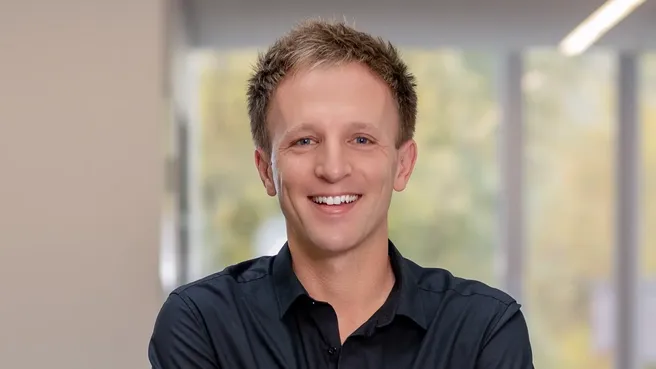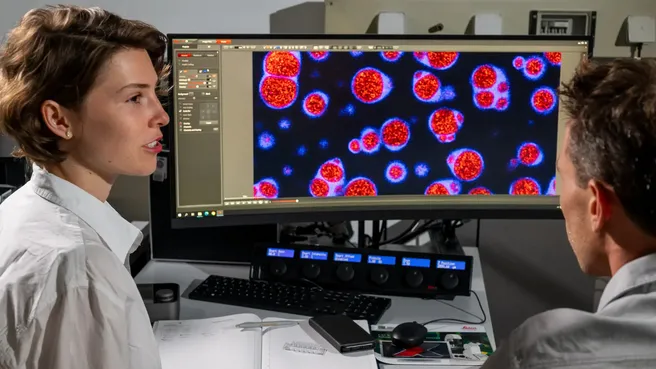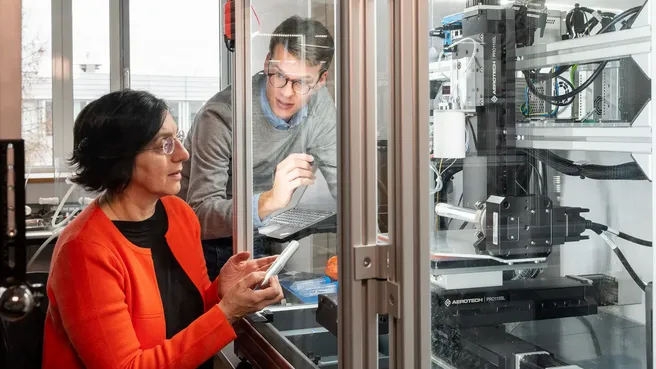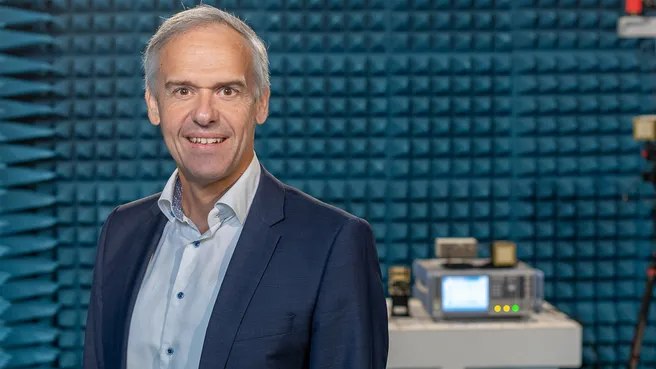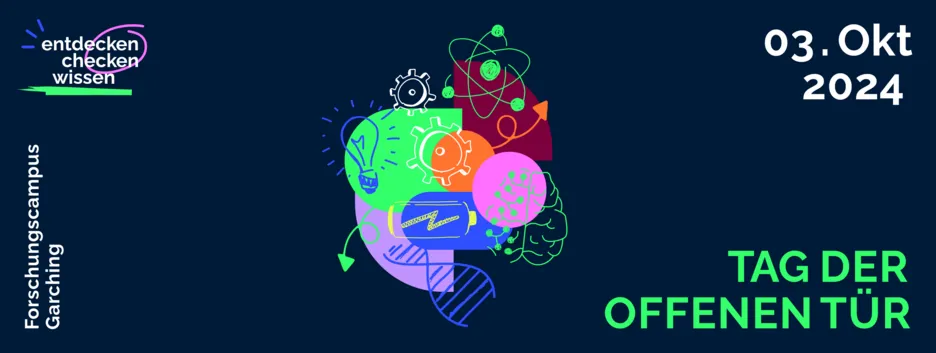
Open day at the Garching research campus
On October 3, 2024 from 10 am to 5 pm, the TUM School of Computation, Information and Technology on the Garching research campus will open its doors to all interested parties. Find out what we are researching and what studying with us can look like. Discover our research areas up close.
Stands in the Magistrale | Open units | Lab tour | Lectures | Science Slam
Stands in the Magistrale
Various units of our school will present themselves in the light-flooded entrance hall of the building.
- AdONE TUM Graduate School
- Advisor - Soft Skill Program
- Chair of Safety, Performance and Reliability for Learning Systems
- Chair of Scientific Computing
- Microrobotic Bioengineering Lab
- Munich Center for Machine Learning
- Munich Data Science Institute
- Professorship of Augmented Reality
- Professorship of Nano- and Microrobotics
- Research Group Applied Software Engineering
- University Library
- ZEITlab
- Zuse School of relAI
Open Units
Find out what we are conducting research on and be inspired by experiments and presentations.
Chair of Bioinformatics
Prof. Burkhard Rost
What? Visualizing protein structures: Can artificial intelligence decode the language of life?
Where? 1st floor, corridor 9
Chair of Computer Architecture & Parallel Systems
Prof. Michael Gerndt
What? Interactive wall: Supercomputers - from vector computers to massively parallel systems
Where? 1st floor, corridor 4
Professorship for Image Processing and Artificial Intelligence
Prof. Daniel Cremers
What? State-of-the-art image-based AI: demonstration of a 3D scanner that creates a 3D model of your body in just a few seconds
Where? 2nd floor, corridor 9
Professorship for Cyber-Physical Systems
Prof. Matthias Althoff
What? Robot demonstration in the laboratory
Where? 3rd floor, room 03.07.011
What? Demonstration of an autonomous vehicle with the Chair of Automotive Technology from the TUM School of Engineering and Design
Where? Boltzmannstraße 15
Professorship of Augmented Reality
Prof. Gudrun Klinker
What? Playful research: How do computer games work? Demonstration of current applications and results from the “Games Engineering” degree program
Where? Ground floor, room 00.13.010
ITüpferl
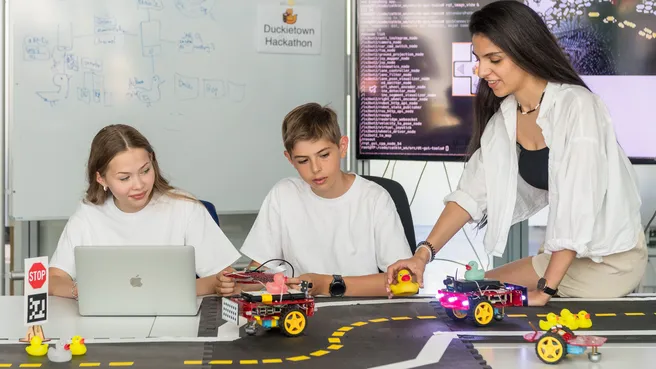
Come to the ITüpferl - interactive laboratory, research workshop and museum of informatics. Children can get creative here: make binary bracelets at small table islands, encode codes and get to know the fascinating world of computer science playfully. Of course, adults are also welcome. Whether young or old - we have computer science to experience and discover!
ix-Quadrat
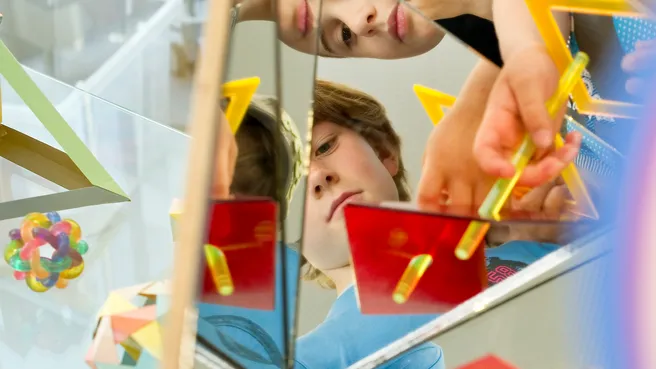
Get to grips with mathematics! Experience symmetry, calculation methods and crazy perspectives up close in the hands-on exhibition ix-quadrat. Discover freestanding exhibits to actively try out and experiment with, and computer programs that allow you to delve deeper into the respective subject area.
Inside the cleanroom
Guided tour through the ZEITlab
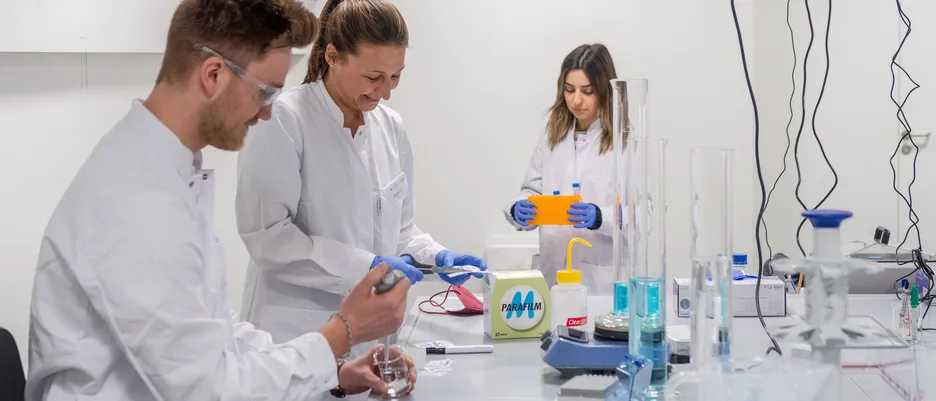
in German language
Find out where the microelectronics of tomorrow originated. The ZEITlab is a makerspace for prototypes and the technology hub of the TUM School of Computation, Information and Technology. It combines neuro- or bio-engineering, chemistry, nanostructuring, microelectronics, measurement technology, assembly and interconnection technology and prototyping in a laboratory network.
Meeting point and registration
The guided tours take place at 10 am, 12 pm, 2 pm and 4 pm. The meeting point is at the stand of the ZEITlab in the main hall of the Mathematics and Informatics building. You can only take part if you register in advance. Unfortunately, all guided tours are fully booked.
Lectures
At our lectures, you will learn about exciting topics in mathematics, computer science, electrical engineering and information technology at first hand.
Mathematik für
Augen, Hände und Ohren
11:00 – 11:30 am
Prof. Jürgen Richter-Gebert
Professorship for Geometry and Visualization
in German
Mathematics is often perceived as an extremely abstract science. However, it can also be made accessible to our senses in a very concrete way.
You will experience this in the lecture using many examples. We will touch on topics such as rhythm and drum patterns, symmetrical ornaments, swarm simulation and molecule formation. We will also take a short excursion into higher dimensions.
Warum funktionieren einfache Trainingsmethoden in der künstlichen Intelligenz so gut?
11:45 am – 12:15 pm
Prof. Felix Krahmer
Professorship of Optimization and Data Analysis
in German
In machine learning, complex neural networks are often used and trained with large amounts of data. However, the training methods are usually relatively simple. This presentation shows why these methods work so well and how mathematics can help to understand them.
Better Robotics through Machine Learning
13:15 – 13:45 pm
Prof. Angela Schoellig
Chair of Safety, Performance and Reliability for Learning Systems
in English
The lecture is about making robots safer and better performing in their environments using machine learning. We use data (which we use for machine learning) we collect from the environment, past performances of the robots, and user directives to improve the robot control and actions.
6G-Mobilfunk, Künstliche
Intelligenz und die
Energiewende:
Zukunft gestalten mit einem Studium der Elektrotechnik und Informationstechnik
14:00 – 14:30 pm
Prof. Thomas Eibert
Chair of High-Frequency Engineering, Academic Program Director for Electrical and Computer Engineering
in German
Using examples from the fields of artificial intelligence, the energy transition and 6G mobile communications, we examine how diverse the subject of electrical engineering and information technology is and show how electrical engineers are helping to shape future technical and social developments.
Understanding the 3D World through a 2D Grid of Pixels
15:30 – 16:00 pm
Dr. Hector Andrade Loarca
Postdoc at the Professorship of Image Processing and Artificial Intelligence, Prof. Daniel Cremers
in English
Computer Vision encompasses techniques and algorithms that allow us to reconstruct a 3D scene and infer semantic knowledge from images and videos. This talk will highlight some of the most celebrated applications of computer vision and the techniques behind them, including the ones developed in our lab.
Science Slam
Research presented up close and excitingly in just 10 minutes - understandable, funny and definitely not boring! There will be two sessions in German and one in English at the Garching Research Campus Open Day. Mathematics Professor Gregor Kemper from the TUM School of Computation, Information and Technology will be there at 12:00 noon. He will tell you everything you always wanted to know about GPS. Visit lecture hall MW1801 in the Mechanical Engineering building at Boltzmannstraße 15.
